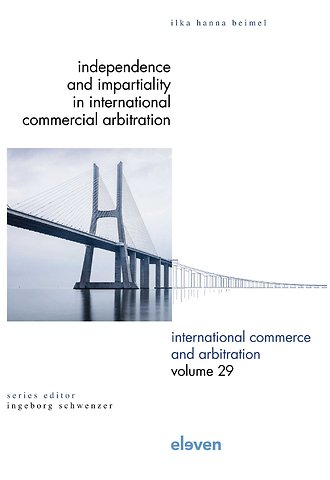Independence and Impartiality in International Commercial Arbitration
An Analysis with Comparative References to English, French, German, Swiss, and United States Law
Samenvatting
Independence and impartiality are key to any judicial process. The dualistic nature of arbitration, i.e., being judicial and contractual, raises the question of how to set the standard of independence and impartiality in arbitration. On the one hand, arbitrators are decision makers similar to judges. On the other hand, they solve disputes outside the courtroom and are (often) appointed by the parties due to their individual expertise.
Against this backdrop, this book analyses the state of play of independence and impartiality. It provides an overview of the current status of independence and impartiality applied in international commercial arbitration, focusing on case law from France, Germany, Switzerland, the United Kingdom, and the United States. The core themes are possible grounds for finding dependence and partiality and their streamline in theoretical standards of independence and impartiality. Additionally, consequences of independence and impartiality are addressed, including the obligation to disclose.
This book is useful for practitioners and scholars alike. It may help counsels preparing a challenge, arbitrators defining their obligation to disclose, and scholars analysing independence and impartiality on a more general basis.
Trefwoorden
Specificaties
Inhoudsopgave
Acknowledgements xix
Introduction 1
1 Introduction to International Commercial Arbitration 9
1.1 The Arbitration Agreement and the lex loci arbitri 9
1.2 Differences between Institutional and Ad Hoc Arbitration 10
1.3 The Dualistic Nature of Arbitration 11
1.3.1 The Judicial Nature of Arbitration 11
1.3.2 The Contractual Nature of Arbitration 13
1.4 Concluding Remarks 15
2 Applicable Laws, Rules, and Guidelines 17
2.1 IBA Guidelines on Conflicts of Interest in International Arbitration (IBA Guidelines 2014) 17
2.2 IBARules on the Taking of Evidence in InternationalArbitration (IBA Rules 2020) 19
2.3 IBA Guidelines on Party Representation in International Arbitration (IBA Guidelines 2013) 19
2.4 IBA Rules of Ethics for International Arbitrators (IBA Rules 1987) 20
2.5 Institutional Guidelines and Codes 21
2.6 European Law 24
2.7 New York Convention 26
2.8 UNCITRAL Model Law 27
3 Overview of the Compared Legal Systems 31
3.1 France 31
3.2 Germany 32
3.3 Switzerland 34
3.4 United Kingdom 35
3.5 United States 36
4 Conflicts of Interest 39
4.1 Relationships 40
4.1.1 Arbitrator’s Relationship 42
4.1.1.1 Arbitrator’s Relationship with a Party or Counsel 43
4.1.1.2 Arbitrator’s Relationship with a Witness 80
4.1.1.3 Arbitrator’s Relationship with an Expert 82
4.1.1.4 Arbitrator’s Relationship with Another Arbitrator 83
4.1.1.5 Arbitrator’s Relationship with an Appointing Authority or Institution 87
4.1.2 Law Firm Conflicts 88
4.1.2.1 Relationship between the Arbitrator’s Law Firm and a Party 89
4.1.2.2 Relationship between the Arbitrator’s Law Firm and Counsel’s Law Firm 92
4.1.2.3 Relationship between the Arbitrator’s Law Firm and a Witness 93
4.1.2.4 Relationship between the Arbitrator’s Law Firm and Another Arbitrator’s Law Firm 93
4.1.3 Tribunal Secretary’s Relationships 94
4.1.3.1 Status of Tribunal Secretaries 94
4.1.3.2 Potential Conflicts of Interest in Form of Relationships 102
4.1.4 Counsel’s Relationships 105
4.1.4.1 Potential Conflicts of Interest 105
4.1.4.2 Involvement of a Third-Party Funder 107
4.1.5 Expert’s Relationship 109
4.1.5.1 Tribunal-Appointed Experts 110
4.1.5.2 Party-Appointed Experts 112
4.2 Conduct 113
4.2.1 Arbitrator’s Conduct 114
4.2.1.1 Ex Parte Communication with the Parties 116
4.2.1.2 Comments and Actions during the Proceedings 124
4.2.1.3 Deliberating and Decision-Making 131
4.2.1.4 Tribunal Orders and the Arbitral Award 133
4.2.1.5 Familiarity with the Subject Matter 134
4.2.1.6 Non-Disclosure as a Ground for Finding Dependence and Partiality 139
4.2.1.7 Conduct Provoking (Tactical) Challenges 142
4.2.1.8 Involvement of Social Networks 145
4.2.1.9 Involvement of Third-Party Funding 146
4.2.2 Counsel’s Conduct 148
4.2.2.1 General Remarks 148
4.2.2.2 Interviewing and Briefing an Expert or Witness 149
4.2.3 Conduct of the Tribunal Secretary 150
4.2.4 Conduct of the Arbitral Institution 153
4.2.5 Arbitrator’s Nationality, Language, or Cultural Affiliations 155
4.3 Concluding Remarks 156
5 Other Potential Grounds for Challenge or Annulment Based on Dependence and Partiality 159
5.1 Previous Challenge of the Arbitrator in Unrelated Proceedings 159
5.2 Arbitrator Being Convicted 160
5.3 Institutional Dependence and Partiality 161
5.4 Cumulation of Grounds 165
5.5 Concluding Remarks 167
6 The Applicable Standard of Independence and Impartiality 169
6.1 Definite Dependence and Partiality versus Potential Dependence and Partiality 170
6.1.1 Perspective 171
6.1.2 Different Standards 174
6.1.2.1 Definite Dependence and Partiality or Actual Bias 174
6.1.2.2 Real Possibility of Dependence and Partiality 177
6.1.2.3 Definite Risk of Dependence and Partiality 179
6.1.2.4 Justifiable Doubts on Independence and Impartiality 180
6.1.2.5 Impression of Dependence and Partiality 184
6.1.2.6 Potential Dependence and Partiality 186
6.1.3 Evaluation and Comparison 187
6.1.3.1 Evaluation of Different Standards 188
6.1.3.2 Comparison with Judges 190
6.2 Same Standards for All Grounds at All Stages in the Proceedings 193
6.2.1 Different Grounds in General 193
6.2.2 Non-Disclosure as a Special Ground 195
6.2.3 Different Stages in the Proceedings 196
6.3 Same Standard for All Arbitrators 197
6.3.1 Partisan Party-Appointed Arbitrators 199
6.3.2 Sympathetic Party-Appointed Arbitrators 202
6.3.3 Three Independent and Impartial Arbitrators 203
6.4 Same Standard for Unconscious Bias 205
6.5 Parties’ Possibility to Modify the Standard 206
6.5.1 Agreeing on a Lower Standard of Independence and Impartiality 207
6.5.1.1 Agreement 208
6.5.1.2 Modification Due to Limited Pool of Arbitrators 210
6.5.2 Agreeing on a Higher Standard of Independence and Impartiality 211
6.6 Standard for Experts 212
6.7 Standard for Tribunal Secretaries 214
6.8 Concluding Remarks 215
7 Consequences 217
7.1 Disclosure 218
7.1.1 Scope of Disclosure – What Needs to Be Disclosed 219
7.1.1.1 Broad Scope of Disclosure 219
7.1.1.2 Limited Scope of Disclosure 225
7.1.1.3 Intermediate Scope of Disclosure 229
7.1.1.4 Necessary Specificity of Disclosure 236
7.1.1.5 Individual Scenarios 236
7.1.2 Personal Scope of the Obligation to Disclose 245
7.1.2.1 Arbitrators and Co-Arbitrators 245
7.1.2.2 Experts 246
7.1.2.3 Parties, Counsels, and Third-Party Funders 247
7.1.3 Point in Time of Disclosure 249
7.1.4 Consequences of Non-Disclosure 250
7.1.4.1 Differentiation between Disclosure and theApplicable Standard of Independence and Impartiality 251
7.1.4.2 Non-Disclosure May Hinder Independence and Impartiality 252
7.1.4.3 Arbitrator’s Liability 254
7.1.5 The Obligation to Investigate 257
7.1.5.1 Parties’ Obligation to Investigate 258
7.1.5.2 Arbitrators’ Obligation to Investigate 259
7.2 Right to Object and Waiver 261
7.2.1 Knowledge of the Waived Fact 262
7.2.2 Lack of Timely Objection 265
7.2.3 Waiver in Regard to Cumulated Grounds 266
7.2.4 Advance Waiver 267
7.3 Circumventing the Arbitrator’s Challenge 270
7.3.1 Exclusion of Party-Appointed Experts 270
7.3.2 Exclusion of Witnesses 273
7.3.3 Exclusion of Counsel 273
7.3.3.1 Tribunal’s Authority to Exclude Counsel 273
7.3.3.2 Grounds for Exclusion of Counsel 277
7.4 Concluding Remarks 280
8 Conclusion and Outlook 283
8.1 The Standard of Independence and Impartiality 283
8.2 The Obligation to Disclose 284
8.3 The Use of Case Law 285
8.4 Tendencies of Harmonisation 286
8.5 Practical Guidance 287
Bibliography 291
Table of Cases 315
Index 329
Net verschenen
Rubrieken
- aanbestedingsrecht
- aansprakelijkheids- en verzekeringsrecht
- accountancy
- algemeen juridisch
- arbeidsrecht
- bank- en effectenrecht
- bestuursrecht
- bouwrecht
- burgerlijk recht en procesrecht
- europees-internationaal recht
- fiscaal recht
- gezondheidsrecht
- insolventierecht
- intellectuele eigendom en ict-recht
- management
- mens en maatschappij
- milieu- en omgevingsrecht
- notarieel recht
- ondernemingsrecht
- pensioenrecht
- personen- en familierecht
- sociale zekerheidsrecht
- staatsrecht
- strafrecht en criminologie
- vastgoed- en huurrecht
- vreemdelingenrecht

